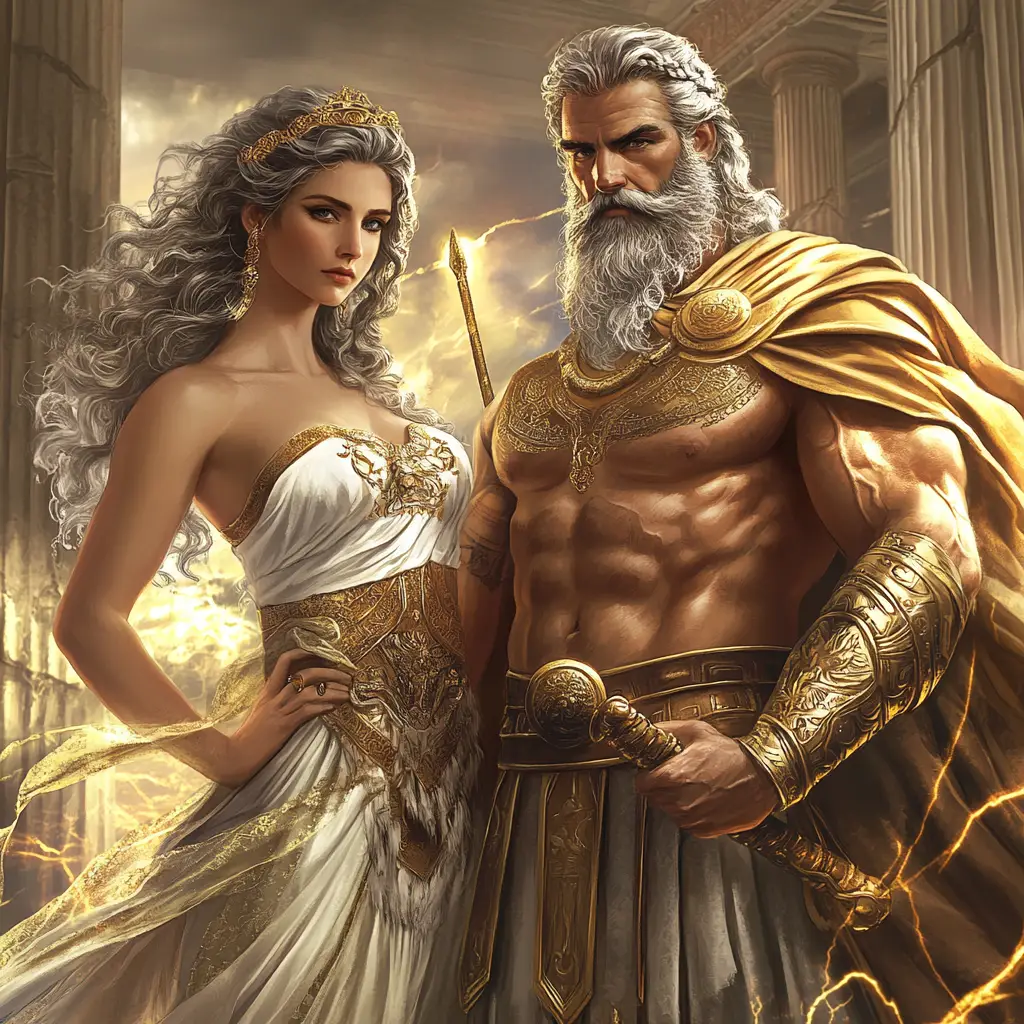The Greek pantheon is filled with gods and goddesses who embody various aspects of the human experience, from love and beauty to war and wisdom. Among these divine figures, Metis stands out as a unique and powerful Titan goddess, representing wisdom, deep thought, and craft.
Though not as widely known as some of her Olympian counterparts, Metis plays a crucial role in Greek mythology, particularly in the story of Zeus and the birth of Athena.
Who is Metis in Greek Mythology
Metis, whose name means “wisdom,” “skill,” or “craft,” was one of the Oceanids, daughters of the Titans Oceanus and Tethys. As such, she belonged to an ancient lineage that predates even the Olympian gods.
According to the story of Metis in Greek mythology, the goddess was blessed with exceptional wisdom, knowledge and foresight.
Her status as a Titaness and her attributes of wisdom made her a significant figure during the early mythological narratives, especially during the Titanomachy—the epic battle between the Titans and the Olympian gods.
The Role of Metis during the Titanomachy
As the Titan goddess of wisdom and craftiness, it is no surprise that Metis played a significant role in the battle between the Titans and the Olympian gods.She also helped Zeus free his brothers, who had been swallowed by Kronus centuries before.
According to Greek mythology, Metis prepared an emetic—a substance that induces vomiting when consumed. The goddess presented the substance to Zeus and instructed him to trick his father into consuming it. Zeus slipped the poison into Kronus’s drink, forcing him to vomit his brothers, whom the titan had swallowed.
During the Titanomachy, Metis was already enamoured with Zeus, and she actively supported the Olympian gods with the counsel and strategy needed to overthrow the Titans.
She was instrumental in helping Zeus devise the plan to free the Cyclopes and the Hecatoncheires from their imprisonment in Tartarus. These ancient beings were powerful allies who provided Zeus and his siblings with the weapons needed to defeat the Titans—Zeus’ thunderbolts, Poseidon’s trident, and Hades’ helm of darkness.
Metis, Zeus and the Prophecy of Gaea

After the defeat of the Titans and the establishment of the Olympian order, Metis became Zeus’s first wife. Their union was seen as a harmonious blending of strength and wisdom, with Metis serving as a wise counsellor to the king of the gods. However, this relationship was marred by a dark prophecy.
According to the Oracle of Gaea, the Earth goddess Metis was destined to bear two children: a daughter who would be exceptionally wise and powerful and a son who would eventually surpass Zeus and overthrow him.
This prophecy struck fear into Zeus, as it mirrored the cycle of son overthrowing father that had plagued his own lineage—from Uranus to Cronus and then to Zeus himself.
Driven by fear of this potential usurpation, Zeus took a page from his father’s book. In an unprecedented move of betrayal, he tricked Metis into transforming herself into a fly and then swallowed her whole, hoping to prevent the prophecy from coming true.
Read Also: Ancient Mesopotamian goddess that eats babies.
Metis and the Birth of Athena
When Metis was betrayed, she was already pregnant with Athena. Since she was immortal, she continued to live inside Zeus. Athena was born and raised in this environment.
With Athena now fully grown, she Migrated into Zeus Skull and began to cause him excruciating headaches. The pain became unbearable, and eventually, with the help of Hephaestus, the god of blacksmiths and craftsmen, Zeus’ head was split open with an axe. From this wound sprang Athena, fully grown and clad in armour.
The Titan goddess Metis, however, remained within Zeus, and the prophesied son was never born.
Symbolism of Metis in Greek Mythology

Metis is often symbolized as the epitome of wisdom, intelligence, and strategic thinking. Unlike other goddesses who were primarily associated with physical attributes or specific domains, Metis represented a more abstract concept—one of cunning and craft. Her attributes go beyond mere wisdom; they include deep thought, insight, and the ability to foresee the consequences of actions.
Zeus’ swallowing of Metis is also rich in symbolism. It represents the assimilation of wisdom into the very fabric of Zeus’ being. This could be interpreted as a metaphor for the integration of wisdom into leadership, suggesting that true power is incomplete without the guidance of intelligence and foresight.
Metis’ wisdom is also characterized by its dual nature—it is both nurturing and destructive. While she aids Zeus in his rise to power and the establishment of the Olympian order, her wisdom also poses a threat, as evidenced by the prophecy of her second child.
This duality is a recurring theme in Greek mythology, where wisdom and knowledge are seen as both beneficial and potentially dangerous, depending on how they are wielded.
Metis and Her Legacy in Modern Times
Though not as prominent as other gods and goddesses in Greek mythology, Metis’ legacy is significant in modern times in various ways. Her story is often cited in discussions about the nature of wisdom, intelligence, and the role of women in mythological narratives.
As the mother of Athena, Metis’ influence extends to one of the most enduring symbols of wisdom and strategic warfare in Western culture.
Conclusion: The Enduring Significance of Metis
Metis, the Titan goddess of wisdom and craft, occupies a unique place in Greek mythology. Her story, filled with triumph and tragedy, is a powerful reminder of the complexities of wisdom and power.
